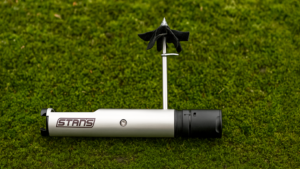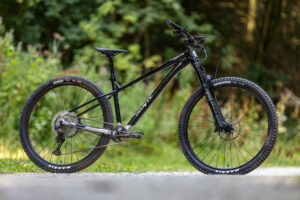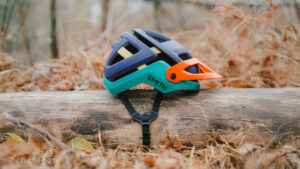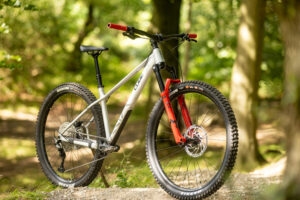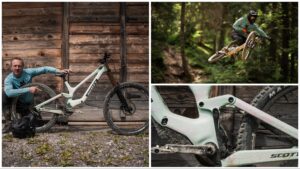Will instantly win you over as you carve effortlessly through corners, blast down the rowdiest descents and spin up loose technical climbs with aplomb
Scott Scale 730 Plus (2017) review
There’s a mindboggling array of hardtails that come under the Scott Scale umbrella. In fact, we counted 31 unique versions of the regular Scale, which doesn’t include the nine dedicated XC race bikes that form the Scale RC range.
>>> The best Plus mountain bikes

Thankfully, things are simpler at the trail end of the spectrum, with just three unisex models and one Contessa version of the Scale Plus; all of which come with 2.8in Maxxis Rekon tyres and 120mm-travel forks.
Buy Now: Scott Scale 730 Plus 2017 at Rutland Cycling from £1,278.99
The Scale 730 Plus is the entry-point to the range, but you still get the same lightweight aluminium frame as the more expensive bikes. Features include Boost 148x12mm dropouts, curved seatstays to improve compliance, and internal cable routing for a sleek modern finish.
It’s also worth pointing out that this is version 2.0 of the Scale Plus frame, so while it looks similar to last year’s bike, Scott has actually tweaked the sizing and geometry, the biggest difference being that the head angle is now two degrees slacker. As such, the Scale 730 has the most progressive geometry in this test. Sizing isn’t long by modern standards though, so the tallest riders will still find that even the XL frame size comes up a little short.

XCR32 fork is sensitive enough without wussing out on the rough stuff
Suspension
Being the most expensive bike on test, you’d expect the Scott to have the highest specification fork… it doesn’t. Still, the coil-sprung SR Suntour XCR RL-R is a solid performer. It’s super sensitive and the stock spring rate is firm enough to prevent it bottoming too easily on drops and jumps. It also has a good range of rebound adjustment, and now that we know how to work the Q-Loc 15mm axle, (instructions now come with the fork) it’s gone from being one of our least favourite designs, to the quickest and easiest to use.
Our only real concern with the fork is that grease from the spring is already coming out through the main seal and onto the upper tube, making it something of a dirt magnet.
Components
The 2.8in Maxxis Rekon tyres are like a cross between a High Roller and an Ardent, making them a great choice for all conditions. They are easily the best rubber on test and because Scott mounts them on 35mm rims they have a really good profile and you get the additional weight savings of the narrower rims.

We’d rather see a 1x drivetrain for security and simplicity
The 2×10 Shimano drivetrain performed flawlessly, the bigger 36t outer ring elevating the chain further above the chainstay to give a relatively quiet ride, even in the absence of a chainstay protector and clutch rear mech. Yes, we did drop the chain on several occasions, and given that all of the other bikes in this test have 1x drivetrains, Scott really is on the back foot here.
Performance
One of the biggest advantages that the Scott Scale 730 Plus has over its competition are the excellent Maxxis Rekon tyres. But seeing as we chose Maxxis Rekons as our control tyres, we effectively gave the other bikes a leg up in this test. Even with that, the superior frame quality, geometry and handling of the Scott shone through.

Curved seatstays both aid compliance and increase tyre clearance
From the get-go it was the bike that impressed us the most. Granted, the frame isn’t as forgiving as the Marin, but it offers a smoother, more composed, ride than either the Cannondale or the Specialized. It’s also more playful and engaging than both of those bikes. And, contrary to popular belief, the slacker head angle actually makes it easier to navigate rocky technical climbs as you’re not constantly fighting the steering to stay on track.
It’s on the descents, however, where the Scott really increases its lead on the competition. With superbly balanced weight distribution you can push the 2.8in tyres to their very limits, diving into corners with unprecedented confidence. It’s basically a riot to ride, and even though aspects of the specification aren’t on point, the handling of the Scott Scale 730 Plus is razor sharp.

Verdict
Given that Scott Scale 730 Plus is the most expensive bike here and it doesn’t get a 1x drivetrain, an air-sprung fork or even a clutch rear mech, it’s going to be a tough sell on the shop floor. Get it out on the trail, however, and it will instantly win you over as you carve effortlessly through corners, blast down the rowdiest descents and spin up loose technical climbs with aplomb. In every situation it handles like a charm, so even though the Scale 730 Plus isn’t dressed to impress, it’s hard not to be bowled over by its performance.









